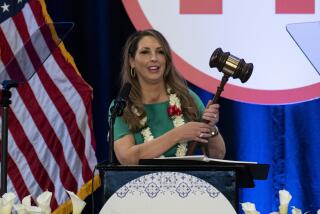Soviets Hope Party Congress Can Mend Perestroika Rift : Communists: Policies are being revised to give the platform broader appeal, an official said.
- Share via
MOSCOW — The Soviet Communist Party, torn by more internal dissent today than at any time since the 1920s, is struggling to avert an open split among its members over the course of perestroika, the party’s chief ideologist said Wednesday.
Vadim A. Medvedev, the party secretary for ideology and a key adviser to President Mikhail S. Gorbachev, said the party leadership would use the forthcoming party congress, called to make crucial decisions on future reforms, to consolidate support for perestroika-- even, it appears, at the cost of bolder moves.
Medvedev said that the party’s platform, introduced in draft form three months ago, is being rewritten in as broad a form as possible, with proposals from across the political spectrum to avoid defections to either the left or the right.
Proposed new party rules are also being revised further, he said, to allow active dissent by members--but without impairing the party’s ability to act.
“We are making all efforts to prevent the fragmentation of the party prior to, during and even after the congress,” Medvedev said. “In working on major documents, including the platform and the rules, we are trying to develop the broadest possible basis. . . .
“We will set certain boundaries--the socialist choice (for the country’s political and economic system) and certain social and ideological values--but they will be broad enough to unite all forces of perestroika. “
The future of the Soviet Communist Party, which has ruled the country since the 1917 Bolshevik Revolution, is clearly in the balance, and the party leadership is confronted with choices between the policies it wants to pursue and the danger that the party will split over them.
The search for an early compromise is important, for it will shape both the decisions of the delegates and their election of a new party leadership at the congress next month.
Gorbachev has been pressed hard by party conservatives for a pre-congress purge of radicals, but little appears to have been done to put into effect instructions from the party’s policy-making Central Committee for a review of the membership.
At the same time, Gorbachev is challenged aggressively from the left to act more boldly, even at the risk of breaking with traditional Marxism-Leninism and driving conservatives out of the party.
“We stand for consolidation,” Medvedev said. “We are against the disintegration and splintering of the party.”
But Medvedev, who is also a member of the ruling Politburo, said the party’s political elasticity does have limits, and he acknowledged that members of the Democratic Platform, a liberal group still operating within the party, might well quit to form a party of their own.
“There is every opportunity to avoid a split in the party, but unfortunately not everything depends on us,” he said. “As for members who espouse alternative platforms, if they are for constructive dialogue, fine. If other . . . interests prevail, that is a matter for those comrades.”
A greater threat has come from the right, however, with the threatened formation of an independent Russian Communist Party, which would be dominated by conservatives opposed to many of Gorbachev’s reforms.
To preempt that move, the party leadership announced over the weekend that, in a major policy reversal, it would form an official Russian Communist Party, presumably loyal to Gorbachev. Its founding congress will open here Tuesday.
Medvedev, who in the past strongly opposed the division of the party into ethnic units, contended Wednesday that, in fact, it would become a “barrier” to further fragmentation because it would group about 58% of the party’s 18 million members in a single body and prevent domination of the whole party.
“We need some organizational guarantees that this dominating Russian Communist Party does not cause the development of separatist tendencies in other republican parties,” Medvedev said, referring to rebellions within party ranks in the Baltic republics of Estonia, Latvia and Lithuania, in Armenia and Georgia in the south and in the Ukraine.
The need to preserve party unity has also apparently led the party leadership to drop plans for the adoption of a new party program, for conservatives and radicals would undoubtedly see it as a final struggle for their cause.
Medvedev said there is even sentiment for pushing deliberation over other key policy documents into closed-door commissions to avoid inflaming passions at the congress.
“Political tension in the country is rather high,” he said. “The party and nation are in a critical stage at this time as the final work is completed for the party’s congress.”
The party leadership, seeking a greater mandate for broader and faster reforms, brought forward the congress by a year--it opens here July 2 and is expected to run for a week or more--and it has portrayed the congress as a pivotal event in the country’s history.
More to Read
Sign up for Essential California
The most important California stories and recommendations in your inbox every morning.
You may occasionally receive promotional content from the Los Angeles Times.













